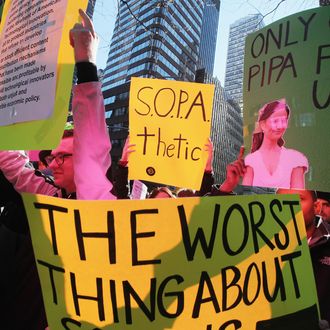
A bunch of the world’s favorite websites, including Wikipedia, Reddit, Google, and some 10,000 more, made their opposition to anti-piracy bills in Congress known today, and were joined by an impressive showing of support online as well as out from behind the screen glow. The rallying even changed some minds. “Earlier this year, [the Protect IP Act] passed the Senate Judiciary Committee unanimously and without controversy,” wrote Republican senator Marco Rubio of Florida, a co-sponsor of the bill, on his Facebook page. “Since then, we’ve heard legitimate concerns about the impact the bill could have on access to the Internet and about a potentially unreasonable expansion of the federal government’s power to impact the Internet. Congress should listen and avoid rushing through a bill that could have many unintended consequences.”
Following Rubio’s lead, Senator John Cornyn, a Texas Republican, requested that Congress take more time with the bill; both Rubio and Cornyn asked Senate Majority Leader Harry Reid to hold off on a procedural vote planned for Tuesday. An original co-sponsor of the bill, Senator Orrin Hatch, a Republican from Utah, withdrew his support as well, calling the law “simply not ready for prime time.” The Stop Online Piracy Act (SOPA), PIPA’s companion bill in the house, also lost the support of two Republican lawmakers, Representatives Lee Terry of Nebraska and Ben Quayle of Arizona.
“As a senator from Florida, a state with a large presence of artists, creators and businesses connected to the creation of intellectual property, I have a strong interest in stopping online piracy that costs Florida jobs,” Rubio said on Facebook. “However, we must do this while simultaneously promoting an open, dynamic Internet environment that is ripe for innovation and promotes new technologies.”
The protests took place, albeit in smaller numbers, in real life, too. The New York Tech Meetup brought a crowd to the Midtown Manhattan offices of Senators Charles Schumer and Kirsten Gillibrand, with rallies also planned out West in tech hubs like Seattle and San Francisco.
Back on the web, Google’s anti-SOPA petition to Congress was signed by 4.5 million people. Yahoo’s photo service Flickr provided a way for users to black out their own photos “to deprive the Web of the rich content that makes it thrive,” while Craigslist informed users about its opposition to the bill on its homepage.
On Twitter, one of the bill’s most vocal proponents remained Rupert Murdoch, whose News Corp. could benefit from the legislation. “Don’t care about people not buying movies, programs or newspapers, just stealing them,” he wrote. Last night, Murdoch opined, “Seems blogosphere has succeeded in terrorizing many senators and congressmen who previously committed. Politicians all the same.” Today he might be seething.
Ron Paul, on the other hand, took to Twitter to egg on the e-protesters. “The internet must remain free!” he wrote. “Proud to see so many taking a stand today.” Senator Lisa Murkowski chimed in to say, “PIPA legislation raises serious concerns about our civil liberties. That’s why next week I plan to oppose the current #PIPA bill.”
Even Mark Zuckerberg, whose Facebook was quieter than its peers about the day of action, wrote a brief Facebook post detailing his opposition. “The internet is the most powerful tool we have for creating a more open and connected world,” he said in part. “We can’t let poorly thought out laws get in the way of the internet’s development.” Zuckerberg, in a moment of online solidarity, even tweeted his views; it was his first message on the site since March of 2009.





























